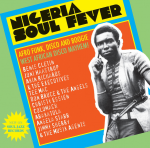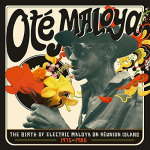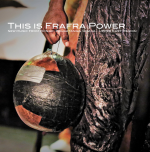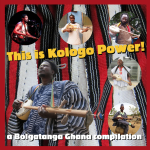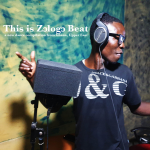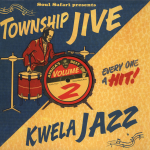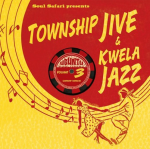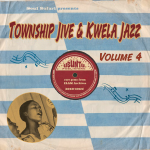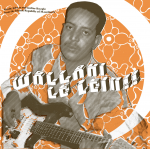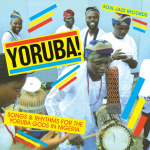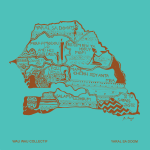Katalog
Suchergebnisse
- 01. Free My People
02. You Can't Change A Man
03. Afrikana Disco
04. Nam myoho renge kyo
05. Greetings
06. Ocheche(Happy Song)
07. Get Up And Dance
08. Enoviyin
09. Do The Funkro
10. Living Everyday
11. Mr Been To
12. Disco Dancing
13. Wake Up Your Mind
14. Nwaeze
15. Soul Fever
16. Wake Up AfricaV/A
Nigeria Soul Fever
Soul Jazz' neuste Veröffentlichung "Nigeria Soul Fever" ist die erste Expedition, um den großen Reichtum nigerianischer Musik aus den 70er-Jahren zu erkunden. Reiseleiter ist Bill Brewster, der Autor von "Last Night A DJ Saved My Life", der die Liner Notes schrieb. Diese Doppel-CD und Tripple-LP ist vollgepackt mit Afro-Funk, Disco und Boogie und bringt eine beeindruckende Sammlung von verschiedenen westafrikanischen Sounds zusammen. Während eine kleine Handvoll der vorgestellten Musiker wie Joni Haastrup, T-Mac oder Christy Essien auch außerhalb Afrikas Erfolg hatten, ist dies im Wesentlichen eine Sammlung von Killertracks, die außerhalb ihres Herkunftslands nie wirklich wahrgenommen wurden. Die Aufnahmen von Künstlern wie Don Bruce & The Angels, Akin Richards & The Executives, Angela Starr, Jimmy Sherry & The Music Agents sind kaum zu findende und vor allem kaum bezahlbare Raritäten. Die Aufnahmen entstanden in einer Zeit, in der Handelsbeschränkungen verboten, Platten aus Nigeria zu exportieren. Während neue musikalische Trends wie American Soul, Funk oder Disco ins Land kamen und ihre Spuren hinterließen, blieb die Szene dort isoliert. Dieses Album folgt auf Soul Jazz' gerade veröffentlichte 60er-Jahre-Kollektion "Nigeria Freedom Sounds" und wird fortgesetzt mit der Neuauflage des seltenen Albums "T Mac Night Illusion" mit nigerianischen Hits aus den 80er-Jahren.- Format
- 3xLP
- Release-Datum
- 06.09.2019
- EAN
- EAN 0730003320712
- 01. Caméléon - La Rosée Si Feuilles Songes
02. Michou - Maloya Ton Tisane
03. Jean-Claude Viadère - Moin La Pas Fait Tout Sel
04. Daniel Sandié - Défoule 3è Age
05. Cormoran Group - P'tit Femme Mon Gâté
06. Marie Helen Et Ses Créol's - Séga Le Sport
07. Françoise Guimbert - Tantine Zaza
08. Vivi - Toé Même Maloya
09. Pierrot Vidot - Commandeur
10. Hervé Imare - Mele-Mele Pas Toué P'tit Pierre
11. Groupe Dago - Réveil Créole
12. Ti Fock - Sé Pi Bodié
13. Gaby Et Les Soul Men - C'est Le Même Cadence
14. Vivi - Mi Bord' A Toé
15. Maxime Lahope - Sous Pied D'Camelias
16. Gilberte - Serre Serre Pas
17. Gaby Et Les Soul Men - Oh Maloya
18. Hervé Imare - Mi Donne A Toué Grand Coeur
19. Carrousel - Oté MaloyaV/A
Ote Maloya 1975-1986
Die Kompilation "Oté Maloya" setzt die 2016 ebenfalls von Strut herausgebrachte Zusammenstellung "Soul Sok Séga" fort. Denn Maloya und Séga sind beides Genres, die auf Mauritius und La Réunion im Indischen Ozean ihren Ursprung haben und dort vor Jahrhunderten von den Sklaven der Zuckerplantagen entwickelt wurden. Charakteristisch ist jeweils die Verschmelzung europäischer und afrikanischer Einflüsse. "Oté Maloya" widmet sich mit den Jahren 1975-1986 einer Phase, als sich Maloya auf La Réunion endgültig aus den Fesseln seiner Vergangenheit löste und zur vorherrschenden Populärmusik der Insel wurde. Bereits in den 1930ern begannen vereinzelt Musiker damit, Maloya-Songs öffentlich zu spielen. Ab den Fünfzigern erschienen erste Maloya-Schallplatten, und im Jahrzehnt darauf avancierte Maloya unter den Jugendlichen zur Protestmusik. Als eine neue Künstlergeneration ab Mitte der 1970er begann, traditionelle Maloya-Songs nicht nur mit eigenen poetischen Texten zu versehen, sondern vor allem diese mit westlichen, afrikanischen und indischen Klangerzeugern zu instrumentieren und Jazz-, Funk-, Rock- und Psychedelia-Elemente einzuflechten, erlebte Maloya einen unheimlichen Popularitätsschub und kam in der Mitte der Gesellschaft an.- Format
- DoLP
- Release-Datum
- 16.06.2017
- EAN
- EAN 0730003315114
- 01. Fausty Amoa Mabila - Nosanayine
02. Awudu messenger - Seero
03. Linda Ayupuka - Ndaana Eera Ymah
04. Atiah Mba - Hunanki
05. Ragazeer - Matala Ligri
06. I Remember Yesterday - Boboriga N Lobema
07. Big Gad - Socre
08. Sugri Hajia Zenabu - SugriV/A
This is Frafra Power
[engl] Bongo is a small town and is the capital of Bongo District, a district in the Upper East Region of Ghana. It’s a twenty minute drive to the border of Burkina Faso; “we share water” one of King Ayisoba’s band members once said. King Ayisoba, one of Ghana’s most famous musicians, was born and raised in Soe, a small village just outside Bongo; a fifteen minute drive on a sand road. Each time I visit the Bongo District, I have to visit King Ayisoba’s family too and pay my respects. Ayisoba’s father and mother are old but vital, they still work the land. I heard that during the harvest time everyone is a farmer. Young people come back home from the big cities like Accra and Kumasi to help with the harvesting and most of them have herded cows and goats when they were young. Sitting on the back of Francis Ayamga’s motorbike we make many stops. Francis plays the traditiona drum in King Ayisoba’s band and he runs a studio in Bongo. He knows most of the people in Bongo, and there is always something new going on. Of course he has to explain why he has a white man on the back of his bike. The people in Bongo are proud of all the musicians and especially of King Ayisoba and his band who play the whole world and bring the Frafra tradition to all the continents. Actually he is teaching the world some Frafra along the way since King Ayisoba is well known for his powerful shouts and interaction with the audience. During one of the King Ayisoba tours Francis gave me a pendrive full of music he recorded in his studio. I listened through all and heard a lot of great music. I made a selection, sat down with Francis and King Ayisoba and then came the idea to make a compilation that represents the music from the Upper East, focused on Bongo, all in Frafra and full of variation: rap, gospel, kologo and traditional chanting, it’s all there. I spent a week at Francis’ Top Link studio and met many great musicians. One of them was Zenabu, a traditional singer who brought her whole women group. They did not fit in the studio so we recorded them outside and it sounds beautiful.- Format
- LP
- Release-Datum
- 22.02.2019
- Format
- CD
- Release-Datum
- 22.02.2019
- 01. King Ayisoba – Africa Needs Africa
02. Ayuune Sule – Who Knows Tomorrow
03. Agongo – I Am Suffering
04. Prince Buju – Afashee
05. Atimbila – I Have Something To Say
06. Atamina Feat. King Ayisoba – Africa Problem
07. Amoru – Yabaa
08. Barnasko – Nsoh Yaaba
09. Asaa Naho – Home Witches
10. King Ayisoba – Nerba
V/A
This Is Kologo Power
[engl] This compilation is an African initiative. King Ayisoba once told me “I want to make the world love kologo music like Bob Marley made the world love reggae music.” In 2014 I played on the launching of King Ayisoba’s V-CD “Kologo Spirit” at the cultural center in Kumasi, Ghana. The event started at three o’clock in the afternoon with a local children circus, then DJs and then a drumming group from the North East Region of Ghana, the region where kologo music is from. Around six the first kologo player entered the stage and the open-air theatre was filled with about two-and-a-half thousand people, mostly Frafra (the popular name for people from the North East Region and the name of their language). Many kologo players followed that night, which went on until three in the morning. I must have seen about twenty for sure. But backstage there were more guys who didn’t even make it to the stage but were playing anyway, backstage, outside and around the scene. Ayuune Sule, Sambo, Stevo, Guy One and of course King Ayisoba played, the audience was amazing, lots of people entered the stage throwing money at the musicians, others came to dance, the night was seriously on fire. It was one of the most amazing musical events I have ever attended. Ayuune Sule and King Ayisoba told me later there are more than eighty-five kologo players already in and around Bolgatanga, the capital of the North East Region. And two years later I was going to see more. In January 2016 King Ayisoba invited me to Ghana again to join in on his “Batakari Festival” (“batakari” is the name of the traditional cloth many of the kologo players wear). One night in Accra and one night in Bolgatanga and I sure did hear and see many more kologo players and not only on those festival nights. Also in the pito-bars (“pito” is a traditional drink based on fermented millet), cafes, FM stations, houses and studios and at a traditional funeral in Bongo (a village near Bolgatanga) I saw lots of amazing kologo players. The idea of making a compilation had been discussed on our European tours already a few times. In the van we listen almost solely to kologo music and there is no lack of great tracks. So together we started picking out the tracks we really liked. There was one dogma: “no computer beats”. King Aysioba wants to show what is the real kologo power and that is made by, as he calls it: “man power”. Most of the tracks are recorded in studios in Ghana. Some are sung in Frafra, others in pidgin English. Some are with a live band and some are just solo kologo and voice. But all songs represent a force and unveil a very strong musical power. The connection between kologo music and (delta) blues has been made more than once and that resemblance is not written on ice; the personal and the social messages, the strong rhythms, the push that this instrument -with only two strings spanned over a goatskin on a calabash- can give to people to make sure they do not ignore the dance floor, all that makes it worth the work and effort of making at least one kologo compilation. So in January 2016, when meeting all the kologo players, I had the change to take pictures and do interviews with everybody. Which you find on the insert. And you should know this is just a tip of the syncopating savannah iceberg, but it’s a good start I think.- Format
- LP
- Release-Datum
- 25.07.2016
- 01. Sammy - Tu Daana
02. Fadester - Guru Anowuu
03. Nmasaana - Mam bange Nidaana
04. Prince Buju - Life is a Mission
05. Awudu - 9090
06. Ramond - Agana Sela Tufu Malla
07. Designer - Guys Boys
08. Joseph - Mam Dola Yine
09. Fcl - Zom Koom
10. Dondada - HosowoV/A
This is Zologo Beat
[engl] This is the music being played on the cell phones, car speakers and sound systems in and around Bongo and Bolgatanga, the main city and capital of Ghana’s Upper East. This is the mix of local rhythms and melodies played on traditional instruments mixed with Ayamga’s Fruity Loops sample madness and Cubase programmed electro beats with on top of it all the words, rhymes, vocals and stories of the young people hanging around the Top Link studio waiting for an opportunity to throw down their voice on a fresh made track. The main language on this album is Fare Fare, the regional language in Ghana’s Upper East region. ‘Zologo’ means ‘crazy’ in Fare Fare (also known as Frafra).- Format
- LP
- Release-Datum
- 07.04.2023
- Format
- CD
- Release-Datum
- 07.04.2023
- 01. Twisting Sisters - Flying Jazz Twist
02. Twisting Sisters - Johnny
03. The Batchelors Featuring Thoko Tomo - Sesir Inyembezi
04. Martindale All Stars - Tshidi
05. Benoni Flute Quintet - Skanda Mayeza
06. Benoni Flute Quintet - Quintet Special
07. Lemmy Special* With The Mofolo Kids - Ek Se Cherry
08. Alexander Sweet Flutes - Broadway
09. Aron & Pieter - Jacko Mambo
10. Aron & Pieter - Ziyavuma Mambo
11. The Skylarks With Miriam Makeba - Baya Ndi Nemeza
12. The V Dolls - Paulina
13. Mighty Queens - Egoli
14. Mighty Queens - Sala Sithandwa
15. Richard Nombali - Teku Special
16. Ndlovu Brothers - Nozipho
17. Sample Siroqo - Ubundibetelantoni
18. Kid Ma Wrong Wrong - 7-2-7V/A
Township Jive & Kwela Jazz Volume 2
[engl] Soul Safari presents volume Two of the Township Jive & Kwela Jazz compilation, featuring 18 rare gems from South Africa, recorded between 1930 and 1962. All titles on this compilation have been carefully handpicked from the ILAM Archives (the International Library of African Music), in Grahamstown, South Africa.- Format
- LP
- Release-Datum
- 18.11.2013
- 01. Telegram Specials - Ngibosen Twist
02. The Young Stars - Izwe Liyasha
03. The Young Stars - Ulowa
04. The Lower Buttons - Intogeymy
05. The Lower Buttons - Nylon
06. Cowboy Superman & His Cowboy Sisters - Kudala Ngizula
07. Que Sisters - Manka Binde
08. Que Sisters - Nice Time
09. Flying Jazz Queens - Mangothobane
10. Flying Jazz Queens - Wamuhle Lomfana
11. Izintombi Zesi Manje Manje - Unjak' Upelile
12. Kid Ma Wrong Wrong - Five Two Six
13. Kid Ma Wrong Wrong - Gumba Gumba 800
14. Kid Ma Wrong Wrong - Seven Stitches
15. Kid Ma Wrong Wrong With The SDV Swing Band - Rock Phata 1001
16. Bra Sello - Lulu Part 4V/A
Township Jive & Kwela Jazz Volume 3
[engl] Soul Safari presents volume Three of the Township Jive & Kwela Jazz compilation, featuring 18 rare gems from South Africa, recorded between 1930 and 1962. All titles on this compilation have been carefully handpicked from the ILAM Archives (the International Library of African Music), in Grahamstown, South Africa.- Format
- LP
- Release-Datum
- 31.10.2014
- 01. Izintombi Zesi Manje Manje - Stamkoko
02. Maphela - Udali
03. Maphela - Sabela
04. Beauty Diloane - Usana Lwam
05. Susan Gabashane & Her Honeybees - Ukhiye
06. Susan Gabashane & Her Honeybees - Ukuhlupheka
07. Alabhama Kids - Umsakazo E Grahamstown
08. Mississippi Brothers - Lizzy
09. Alabhama Kids - Asinamali
10. Peter Makana - Baboon Shepherd
11. Peter Makana - Battle Of The Flutes
12. Black Duke - Shukuma
13. Black Duke - Duke Blues
14. Peter Makana - Black John
15. Peter Makana - Blood Mixture
16. Alfred Dlezi & Dlamini - Egoli ZinyoziV/A
Township Jive & Kwela Jazz Volume 4
[engl] On this great compilation you’ll find 16 early vocal & jazzy tunes from the Golden Age of Jive & Kwela in South Africa. All released originally on fragile shellac discs only, which is a very delicate material but the music survived thanks to the archives of ILAM. A truly great source of South African music is being preserved here for new generations, to inspire young and hopeful musicians and singers from all over the world. These treasures of musical genius were recorded in the glory years of Jive and Kwela, the years 1940-1965. On side A it is not very difficult to recognize the similarities to American popular music like R&B and small combo close harmony singing. But most of all notice that typical South African swing, that Jive, that incredible smooth form of African Jazz on side B; Kwela! The rarest and most treasured finds are collected here, some with the original spoken intros, ‘sketches’ as these were called. Characteristic conversations between the musicians, often in a humoristic slang, always extremely funny. The record is pressed to 180gram vinyl.- Format
- LP
- Release-Datum
- 01.09.2016
- EAN
- EAN 8717127018567
- 01. Kebrou - Banjey `Boogie´
02. Ateg Ould Syed - L'Ensijab
03. Jeich Ould Chighaly - Wezin
04. Kebrou - Bajey
05. Deye Ould Amartichitt - Paris
06. Mohammed Guitar - Banjey & Medh
07. Baba Ould Hembara & Mamma Mint Hembara - Moulana, Laa Moulana
08. Luleide Ould Dendenni - Wezin
09. Mohammed Guitar, Sbeyniat - Guelbi Vatimetou
10. Mohammed Cheikh Ould Syed - El Horr & Az-Zrag
11. Kweli Ould Seyyid & Kleyhid Ould Meylid - WezinV/A
Wallahi Le Zein!
[engl] Originally released as a double CD in 2010, Wallahi Le Zein! has persisted as a cult classic, a collection of a rarely heard and utterly unique underground music scene, raw and unfiltered. The LP, cassette & digital version we now present is intended as an immersive entry into this music: gnarled and virtuosic electric guitars weave hypnotically throughout melismatic sung poetry and exclamations, pulsing hand drums, party chatter, buzzing rigged desert sound systems, and all manner of the ambient sounds of Nouakchott wedded to oversaturated cassette in all its swirling, breathing, psychedelic glory. Operating entirely outside of any local recording industry, these songs were collected from bootleg tape stalls, wedding souveniers, and networks of musicians, expertly curated, researched and produced by Matthew Lavoie. Drawing from the deep well of Mauritanian classical music, the gamut of musical modes and the tidinitt lute repertoire are transposed to the electric guitar - often with frets removed or additional frets installed, “heavy metal” distortion pedals and phasers built into guitar bodies, blurring the lines between Haratine and Beydane musical cultures, the ancient and the futuristic. At times transcendent and transfixing, and conversely a furious and cascading intensity that commands jaw-dropping attention. 160 gram black vinyl LP comes packaged in 2 color, reverse-board jacket with 8 page booklet with extensive notes on the musicians and songs, as well as a history of Mauritanian guitar music.- Format
- LP
- Release-Datum
- 23.07.2021
V/A
Yoruba!
Von den afroamerikanischen Jazzmusikern der Fünfziger wie Art Blakey, Randy Weston und Dizzy Gillespie über die Explosion von "Nu Yorican Latin music" in New York City in den Sechzigern (Mambo, Boogaloo, Latin Funk/Soul) bis hin zu afrikanisch inspirierten und durch die transatlantischen Sklaventransporte ausgelösten Religionen in Kuba (Santería), Brasilien (Candomblé) und Haiti (Voodoo) - der weltweite kulturelle Einfluss westafrikanischer Musik im Allgemeinen und von Yoruba im Speziellen kann gar nicht unterschätzt werden. Typische amerikanische Genres wie New Orleans Jazz, Hip-Hop, Gospel und Soul haben hier ihre Wurzeln. Eine klingende und ausgesprochen rhythmische Verbindung zieht das Album "Yoruba!". Es enthält 13 Stücke, die unlängst in Lagos mit lokalen Trommlern unter Führung von Olatunji Samson Sotimirin aufgenommen wurden. Die vorherrschenden Perkussioninstrumente sind Talking Drum, Bata und Dundun. Sie werden durch eine Riege von Sängern und Sängerinnen begleitet. Die Hauptstimme stammt von Janet Olufanmilayo Abe. Für die Produktion zeichnen Stuart Baker, Labelchef von Soul Jazz, und Laolu Akins verantwortlich. Die Veröffentlichung wird durch ein umfangreiches Booklet mit informativem Text- und Bildmaterial begleitet.- Format
- DoLP
- Release-Datum
- 04.05.2018
- EAN
- EAN 5026328003993
- 01. Yaral Sa Doom
02. Thiante
03. Mouhamodou Lo and His Children
04. Salamaleikoum
05. Gouné Yi
06. Yaral Sa Doom II
07. Riddim Rek Sa Niouy Mom
08. Mame Cheikh Sidy Anta Mba
09. Si Tu Savais Juste
10. Legui LeguiWAU WAU COLLECTIF
Yaral Sa Doom
Kosmische Avantgarde Sounds aus Senegal: "Yaral Sa Doom" ist ein bahnbrechendes Album, das Grenzen und musikalische Szenen überspannt. Inspiriert von westafrikanischen Traditionen, Sufi-Lobpreisliedern, spirituellem Jazz und Dub-Rhythmen, ist das Ergebnis ein genreübergreifender Einstieg in einen internationalen Sound, der seinesgleiche sucht. Hypnotische Perkussionsschleifen über wogenden Flächen, Call-and-Response-Gesänge, die sich über elektronische Beats legen, und Kinderstimmen, die zu Aufnahmen von rauschenden Wellen singen. 2018 reiste der schwedische Musikarchäologe und Leftfield-Musiker Karl Jonas Winqvist nach Toubab Dialaw im Senegal, einem kleinen Fischerdorf, das zum Zentrum der senegalesischen Boheme-Kunstszene wurde. In den nächsten Wochen kamen dort Musiker, Perkussionisten, Dichter und Beatmaker zusammen, um Ideen zu skizzieren und freie Improvisationen aufzunehmen. Winqvist kehrte nach Schweden zurück und tauschte die Aufnahmen über WhatsApp mit dem im Senegal lebenden Kollaborateur und Studiotechniker Arouna Kane hin und her. "Yaral Sa Doom" ist eine Wolof-Phrase, die "die Jugend erziehen" bedeutet. Im Zentrum des Albums steht das Thema Bildung, mit Songs, die sich direkt mit den sozialen Problemen des heutigen Senegals, mit Bildung und Immigration auseinandersetzen. "Heute muss man Kinder mit einem Instrument und Kunst erziehen, wenn man ihnen ein Instrument beibringt, lehrt man sie, ihren Geist zu benutzen", sagt Djiby Ly. Mit über 20 Mitwirkenden aus dem Senegal und Schweden ist das resultierende Album vielschichtig und komplex, behält aber eine zentrale Vision bei. "Es ist, als würde man ins Meer eintauchen", erklärt Kane. "Da schwimmen alle möglichen Arten von Fischen herum, aber zusammen bilden sie den Ozean." Nichtsdestotrotz ist es auch eine geografische Anomalie, die nur durch den Austausch im Internetzeitalter möglich wurde. "Yaral Sa Doom" ist eine außergewöhnliche Aufnahme und ein visionärer Einstieg in die Zukunft der transglobalen Zusammenarbeit.- Format
- LP
- Release-Datum
- 26.02.2021
- EAN
- EAN 0602318137265

